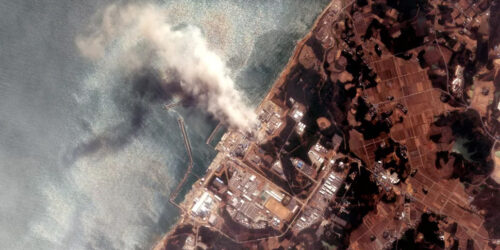The water contains more radioactive material than the plant’s managers previously stated.
Japan’s government announced on Tuesday (April 13) that it will dump more than a million tons of contaminated wastewater from the Fukushima nuclear power plant into the Pacific Ocean, beginning in two years.
Roughly 1.25 million tons (1.13 million metric tons) of water have accumulated around the Fukushima Daiichi nuclear power plant in northeastern Japan since 2011, after a magnitude-9.0 earthquake and resulting tsunami devastated the region. The twin disasters killed nearly 20,000 people, according to NPR, and caused meltdowns in three of the plant’s six reactors, triggering the worst nuclear disaster since Chernobyl.
To keep the remaining reactor cores from melting, officials with the Tokyo Electric Power Company (TEPCO) have been pumping nearly 200 tons (180 metric tons) of cooling water through the site every day, according to The New York Times. That contaminated wastewater is stored in more than 1,000 enormous tanks on site and automatically filtered to remove most of the radioactive material, except for tritium — a radioactive isotope of hydrogen that is considered hazardous to human health in large amounts, according to the nonprofit Health Physics Society.
Now, 10 years after the disaster, TEPCO is running out of room to store the wastewater. The disposal plan, which was approved in a government cabinet meeting on Tuesday, will see the wastewater gradually discharged into the Pacific Ocean, most likely over the course of several decades.
Nuclear plants around the world routinely discharge water containing small amounts of tritium into the sea, according to the Times, and a spokesperson from the U.S. State Department called the plan “in accordance with globally accepted nuclear safety standards.” However, the plan has been widely opposed by citizens of both Japan and neighboring countries.
One large concern is that TEPCO’s claims about the water’s safety may be wrong. A study published in the journal Science in August 2020 found traces of several other radioactive isotopes in the Fukushima wastewater, many of which take much longer to decay than tritium.
Some of that radioactive material may have already made its way into local wildlife; In February, Japanese media reported that shipments of rockfish were halted after a sample caught near Fukushima was found to contain unsafe levels of radioactive cesium.
Local fishers are especially worried that dumping Fukushima’s wastewater into the sea could negatively impact their industry, which has already suffered significantly because of the nuclear disaster. According to NPR, fish catches in the area are at just 17.5% of pre-disaster levels, and fishers fear that their jobs will become “impossible” should the government go ahead with the planned wastewater disposal.





